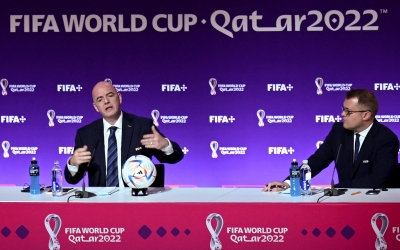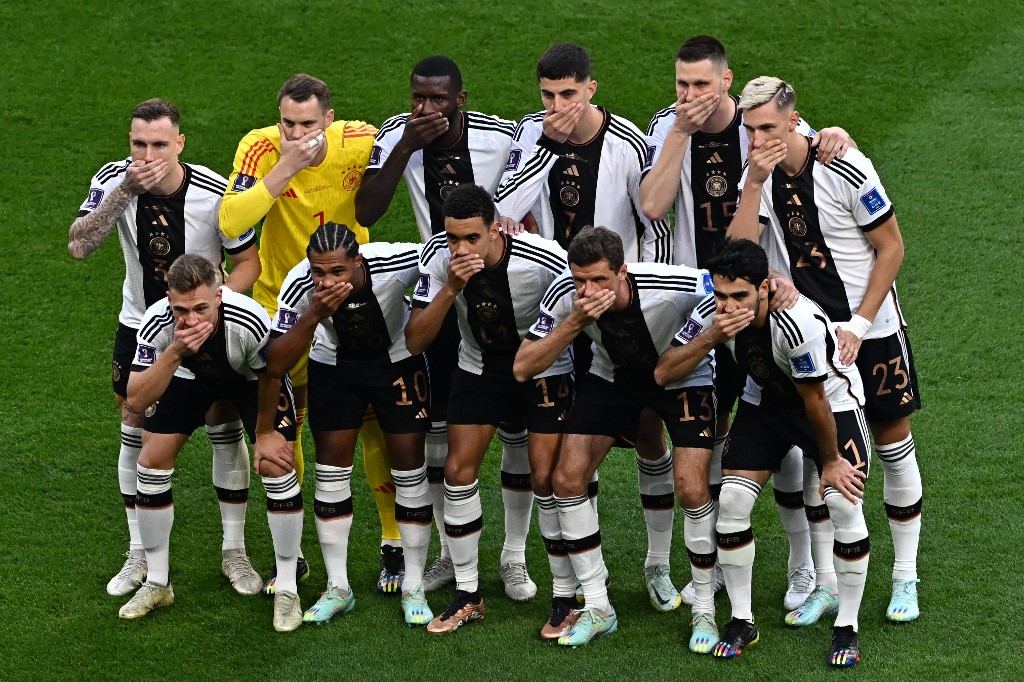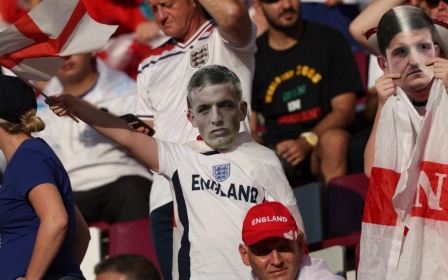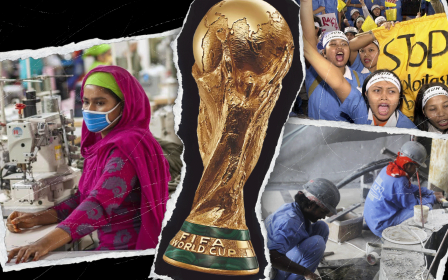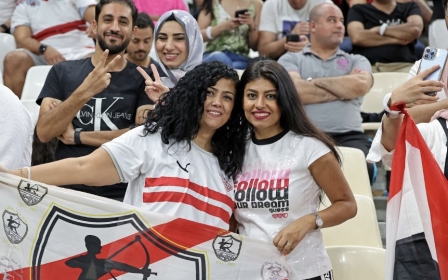Qatar World Cup: White outrage, colonialism and a game of capitalist greed
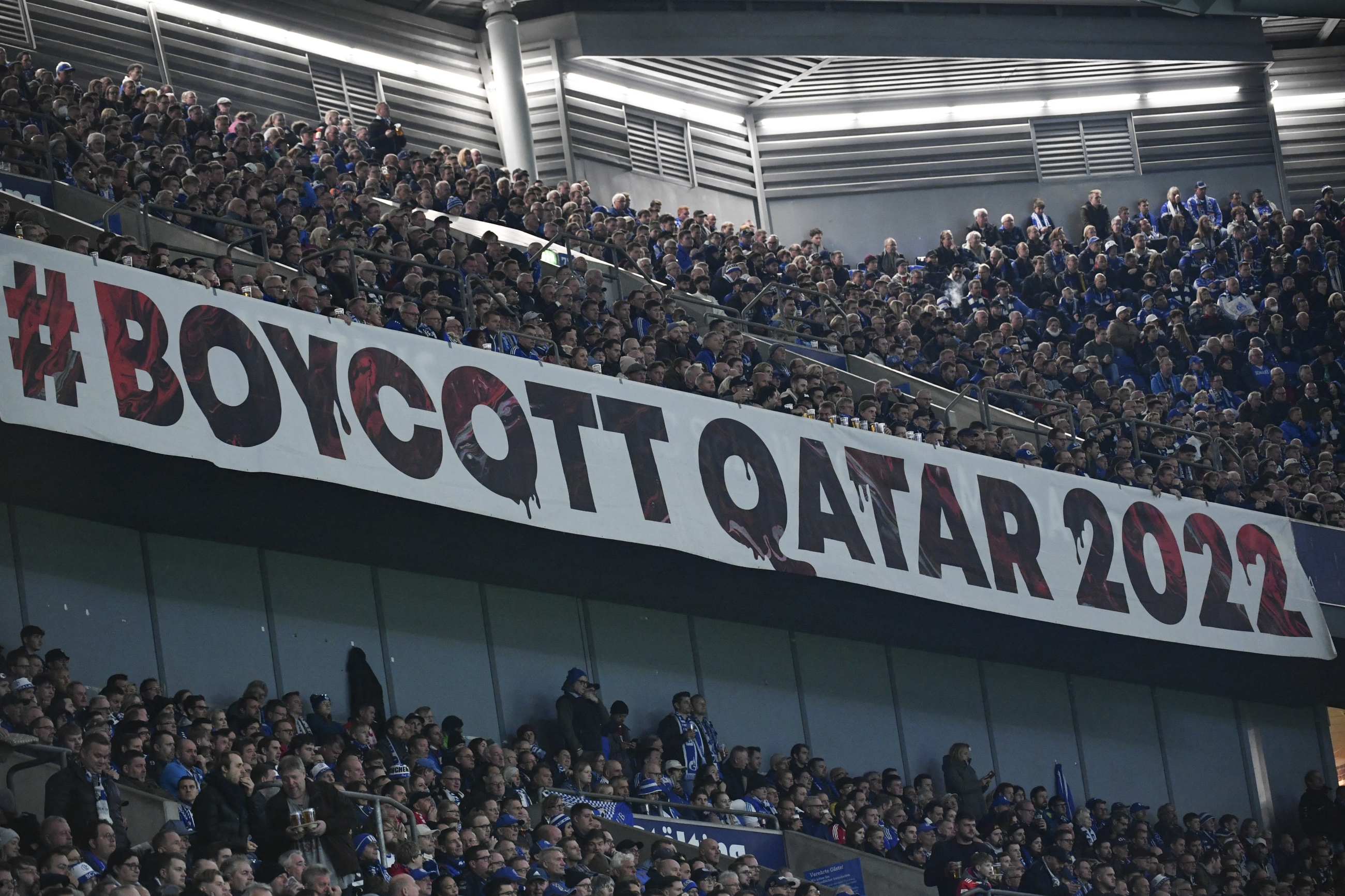
As the World Cup kicked off last week, liberal European and American attacks on Qatar’s human rights record, including an Amnesty International report, filled the airwaves and social media, with much focus on migrant workers and LGBTQ rights and the religiosity of the country.
The passions that football has given rise to over the decades, however, seem oblivious to the colonial, racial, national and capitalist history of the sport.
Indeed, the question of human rights did not seem to perturb white liberals much before the 2018 games in Russia, or this year’s in Qatar.
That liberal human rights concerns more often than not fully reflect those of the imperialist US and European countries is hardly coincidental.
New MEE newsletter: Jerusalem Dispatch
Sign up to get the latest insights and analysis on Israel-Palestine, alongside Turkey Unpacked and other MEE newsletters
Liberal hypocrisy
When England hosted the World Cup in 1966, homosexuality was still illegal, and remained so in Scotland until 1980 and in Northern Ireland until 1982. When the law was finally amended, it merely "decriminalised private homosexual acts between men aged over 21, while at the same time imposing heavier penalties on street offences".
As for workers’ rights, ongoing discrimination against non-white workers was rampant, including in British trade unions.
Britain maintained its colonial holdings across the globe, from the then defiant white settler-colony of Rhodesia to Hong Kong and the Malvinas (Falkland) Islands to what were yet recent crimes against the Kenyan people who had just obtained independence in 1963. They were of little concern to human rights defenders.
Qatar itself was at the time under British colonial rule.
Britain then, as now, still had blasphemy laws and the Church of England remains its official religion. Still, it hosted the World Cup without complaint from Europe’s civil libertarians, least of all from Amnesty International.
In 1974, when West Germany hosted the World Cup, the population in that country was experiencing its latest wave of government repression.
In 1972 the West German government began to purge "radicals" from the civil service (which then included 20 percent of the West German workforce). West German trade unions routinely expelled "activist" members. The Federal Office for the Protection of the Constitution investigated 2.5 million citizens.
In fact, 800,000 applicants for civil service jobs were investigated regarding their “allegiance” to the constitution. A policy of blacklisting, or "Berufsverbot" - for signing petitions, joining demonstrations, etc - of those deemed guilty ensued.
A crackdown on universities, dismissal of teachers, and “voluntary” withdrawals of “questionable” books by publishers was the order of the day. Whereas Nazi anti-homosexual laws, which remained on the books, were repealed in 1969, official anti-homosexual discrimination continued in the country until 2000.
West German racism against Turkish migrant labour was also rampant. Indeed, most of the leadership of West Germany’s Justice Ministry between 1949 and 1973 were former members of the Nazi party, including dozens of former paramilitary SA members.
The campaign has been so intense that Israel, one of the world’s biggest human rights violators, waxed moral about Qatar’s record
But West Germany hosted the World Cup without complaint from Europe’s civil libertarians, least of all Amnesty International (which was urged to intervene on behalf of the Baader-Meinhof prisoners who staged a hunger strike in German prisons, protesting against torture. Amnesty refused to adopt them, as allegations of torture, in Amnesty’s estimation, were not “justified”.)
When the World Cup was held in the United States in 1994, half the US states had anti-sodomy and anti-homosexual laws, and the widely disseminated claim that Aids was a "gay disease" had not yet subsided. The country was proceeding at the time with its sanctions against Iraq, which led to the death of half a million Iraqi children.
Police killing and beating of black men on the streets of US cities became a public scandal in 1991, when the video of police violence against Rodney King in Los Angeles went viral. This aside from the ongoing New Jim Crow system of incarcerating Black people in US prisons, to which the Bill Clinton administration contributed significantly; the use of prisoners as slave labour as permitted by the 13th amendment to the US constitution, and the ongoing violation of Native American rights.
But the US hosted the World Cup without complaint from European and US civil libertarians, least of all Amnesty International (whose report that year criticised the death penalty, and police brutality, and the forcible return of Haitian refugees, but not anti-homosexual laws, let alone the abuse of migrant workers, etc).
When the US hosted the Olympics in 1996 in Atlanta Georgia, Amnesty’s annual report did not even mention the Olympics and repeated its usual criticisms of the death penalty, police violence, and forced repatriation of Haitian refugees it had made in previous years. It did however release a short statement condemning the execution of one man by the state of Georgia.
In contrast, Human Rights Watch (HRW) released a report in 1996 about the state of Georgia’s death penalty, anti-sodomy laws, racism, and anti-poor policies, criticising the fact that the city was hosting the Olympics despite this bad record (in its 1994 report on the US, HRW made no mention of anti-sodomy laws).
Neither group, however, was part of an international orchestrated campaign against the US being the host to the Olympics. Indeed, as the US, Canada, and Mexico will be hosting the next World Cup, no campaign has been raised as of yet about the three countries’ ongoing human rights violations.
It should be noted that the US won the joint bid to host the 2026 games in 2018 during the Donald Trump administration.
Colonial roots
The ongoing liberal European and American attacks on Qatar’s human rights record should therefore be viewed in the context of this illustrious history in which Europe and the white-ruled US are exempt from most criticism, but not so non-white countries.
The campaign has been so intense that Israel, one of the world’s biggest violators of human rights, including non-white migrant workers’ rights, waxed moral about Qatar’s record.
Fifa's president, the Swiss-Italian Gianni Infantino, responded to these criticisms at the opening of the games last week: “What we Europeans have been doing for the last 3,000 years, we should be apologising for the next 3,000 years before starting to give moral lessons.”
The western press was infuriated and CNN called his words “a tirade”.
The history of football straddles the history of European, especially British, colonialism. A game invented by the British, the first Football Association Cup Final was played in 1872, with a football league organised soon afterwards.
Between 1863 and 1877, football rules were standardised, prohibiting any form of handling the ball. This would also coincide with the rise of the Protestant notion of "Muscular Christianity" that combined proselytising faith and sports to the heathens.
The imperial export of football would then begin in earnest. Its spread in Europe led to the formation of Fifa in 1904 by the football associations of France, Germany, Belgium, Sweden, Spain, Denmark, Switzerland and the Netherlands, which they called Federation Internationale de Football Association (Fifa).
Fifa established the World Cup in 1930. Europeans continue to control the sport’s world governing body: all of Fifa’s presidents have been white Europeans, except a white Brazilian president who was the son of Belgian immigrants, and one Cameroonian acting president who assumed office for less than five months in 2015-2016.
The British introduced their games to their colonies as a way of teaching the barbarians discipline and teamwork and inculcating Christian values. When they brought football to Calcutta in the 1880s, only British referees were allowed.
By 1911, an Indian team, the Mohun Bagan, defeated the British East Yorks Regiment 2-1. In Egypt, native teams began to play against British teams as early as 1916, and competed in the Olympics from 1924 onwards.
Not to be outdone, the French also brought football to their colonies in North Africa. Teams from Algeria, Morocco and Tunisia competed in the North African championship, established in 1919, and vied for the North African Cup, established in 1930.
Similar to other European colonialists, the Zionist movement, since its founding, was most invested in sports and athleticism. One of its founders, Max Nordau, emulated the Protestants by calling for a "Muscular Judaism". Nordau founded gymnasiums for Zionist Jewish youth across Europe.
Due to British influence and missionary schools, the Palestinians already had a few football teams at the beginning of the 20th century. Once the British conquered Palestine in 1917, they used their sports to normalise and integrate the Jewish colonial settler population they were introducing to the country through sports clubs, to which they invited the colonists and the natives to join, so as to forestall native Palestinian resistance.
But the plan did not work, and most of the teams remained separate and independent of the British. Soon, the Zionist colonists set up the Palestine Football Association, which remained exclusively Jewish (save for one Palestinian who joined only one of its directorate meetings), even though it marketed itself to Fifa as representing Mandate Palestine.
Only teams of colonists played in its championship, where the Zionist anthem was played.
Anti-colonial resistance
Despite British intentions, the colonised Palestinians, like the Indians and the Egyptians before them, saw football as a way to assert their anti-colonial nationalism. They organised more sports clubs in the 1930s independent of the British colonial government.
In 1931, the Palestinians established their own Arab Palestine Sports Federation, which had 10 clubs as members, but it would disappear amid the Palestinian Revolt of 1936-1939.
In 1944, despite ongoing British harassment, the Palestinians set up the Arab Palestine Sports Association, which 21 Palestinian clubs joined. By 1947 it had 65 clubs as members. It held its football championship games in 1945 in Jaffa. Indeed, a Palestinian team beat the British army team in a match that year, to the cheers of Palestinians.
Whereas the Palestinian Association sent teams to play in neighbouring Arab countries and Iran, it was unable to register with Fifa, which had already recognised the Jewish colonists’ association as representing Mandatory Palestine.
Arab sports associations protested against Fifa’s decision. As the Zionist conquest of Palestine in 1948 was proceeding, Fifa was in the process of reconsidering the Palestinian and Arab applications.
But if colonised peoples used football against their colonisers to assert anti-colonial passions, it would also lead to endemic hooliganism among British and other European spectators, and to nationalist discord between the colonised themselves, especially in the Arab world.
In Jordan, football has been, since the late 1970s, one of the main arenas to stage an exclusivist Jordanian identity and nationalism against Palestinian identity and nationalism in the country. It is an ongoing conflagration which led last month to the death of a child, who was killed by another child after a match between Al-Wehdat and arch-rivals Al-Faisaly, leading to the intervention of public personalities from both sides to contain the crisis.
The continuing rivalry between the Algerian and Egyptian teams since 2009 led to diplomatic and popular enmity between the two countries. This aside, national pride in French-Algerian (Zinedine Zidane) and Egyptian (Mohamed Salah) players who play on European teams spans the entire Arab world.
'Commodification of passion'
Noam Chomsky once famously declared that "One of the functions that things like professional sports play, in our society and others, is to offer an area to deflect people's attention from things that matter, so that the people in power can do what matters without public interference."
Indeed, football matches, the most popular British colonial game bequeathed to the world, have been a main deflector of people’s attention from the immediate political and economic struggles that confront them. But it is not sports or football as such that deflects, but rather rampant nationalism, as well as Fifa itself.
Football matches have been a main deflector of people’s attention from the immediate political and economic struggles that confront them
As anti-imperialist Uruguayan writer Eduardo Galeano put it, Fifa and its "monarchs", including the capitalist industry that produces sports paraphernalia, are the ones “guilty of transforming every player into an advertisement in motion, while prohibiting them to wear any message of political solidarity”. It is they, he added, "who lust after the commodification of passion and identity".
That Fifa and the World Cup have become major profitable capitalist enterprises is hardly surprising. Those who run international sports understand well the political and financial role of international football.
To them, that countries hosting the World Cup should spend tens of billions of dollars to stage the games, and that Qatar has outspent everyone to the tune of more than $200bn, is money well spent.
The human rights complaints of white liberals, not to mention Amnesty International, would have been more persuasive to a global audience if the liberals had subjected the US and Europe to the same standards to which they now subject Qatar, and Russia before it.
As they stand, the western liberals are only convincing to white liberal audiences, many of whom cloak their anti-Arab racist biases with the shield of human rights.
The views expressed in this article belong to the author and do not necessarily reflect the editorial policy of Middle East Eye.
Middle East Eye delivers independent and unrivalled coverage and analysis of the Middle East, North Africa and beyond. To learn more about republishing this content and the associated fees, please fill out this form. More about MEE can be found here.



